#antiochus iii
Text
Honestly, I would like to see art of Hannibal Barca and Antiochus (III) the Great being best buds.
3 notes
·
View notes
Text
"Antiochos’ and Stratonike’s activities in the eastern part of the [Seleukid] empire are largely shrouded in mystery, but, as Engels has argued, Antiochos was far from idle since he embarked on a large building programme and was active in securing the frontier. There is some evidence to suggest that his new bride accompanied him for much of this period. We can perhaps identify Stratonike’s presence with her new husband in the Upper Satrapies through the gold coinage minted in Susa and Baktria in c . 287. The two gold coin sets are of the same type, the obverse features the laureate head of Apollo facing right and the reverse features Artemis in an elephant biga facing left with the legend ΒΑΣΙΛΕΩΣ ΣΕΛΕΥΚΟΥ in exergue.

Figure 1: Coin of Seleukos I from Baktria Depicting Apollo on the Obverse and Artemis with Elephant Biga on the Reverse (Houghton and Lorber 2002, SC I no. 163).

Figure 2: Coin of Seleukos I from Baktria Depicting Apollo on the Obverse and Artemis with Elephant Biga on the Reverse (Houghton and Lorber 2002, SC I no. 257).
The reverse image of Artemis in the elephant biga is within the same design type as a large range of other coinage issued by Seleukos I celebrating the success of his elephants and thus his eastern campaigns. The appearance of Artemis is however unique to these coin types. This suggests the emphasis on the close links between the twin gods, Artemis and Apollo, depicted on the obverse and reverse of this coinage . Since there appears to be as a close link between Apollo and Antiochos as there is between Zeus and Seleukos, the presence of Artemis could be seen as a symbol for Stratonike. This would create a series of parallels: Seleukos/Zeus, Antiochos/Apollo, and Stratonike/Artemis. The first two reflect what we see for these two kings at the list of priests of Seleukid kings in Seleukeia in Pieria . Additionally, it may be notable that the sister-wife ideology [...] appears to be evident later in the reign of Antiochos.
As all of the Apollo/Artemis cointypes were produced on high value gold coinage, this suggests that it was issued in order to commemorate a significant event. While the type was similar to other Seleukid coinage, the shift from Athena to Artemis was clearly discernible and unique. The arrival of the new joint-King and Queen in the region to take up residence would have been a suitable moment for the issuing of the new coin type. This advertisement of their new rule certainly falls in line with Seleukos’ wedding speech which confirmed their new roles."
-David Engels & Kyle Erickson, "Apama and Stratonike – Marriage and Legitimacy", "Seleukid Royal Women" (edited by Edited by Altay Coşkun and Alex McAuley). The pictures of the coins are screenshots from the book.
#historicwomendaily#stratonike#antiochus I soter#seleukid empire#hellenistic period#ancient history#history#'Antiochus’ and Stratonike’s activities in the eastern part of the empire are largely shrouded in mystery' don't do this to me#this mystery is mainly because of lack of accessibility or of evidence than lack of activity - but it's still a shame#also re the 'sister-wife ideology'#as historians have pointed out Stratonike was called 'hirtu' aka 'principal wife' in the famous Borsippa Cylinder of Antiochus I#an unusual title which indicates her precedence but also implies a polygamous situation (which was normal in the Hellenistic period)#centuries later Stephanos of Byzantion claimed that Antiochus named the city of Nysa 'after his wife Nysa'#Stephanos isn't really reliable: he's almost definitely wrong about the adjacent information he gives about the city of Antioch being named#after Antiochus's mother#but it may nonetheless indicate he had a minor wife named Nysa#epigraphic evidence also suggests Antiochus married a woman called 'sister-wife'#which many scholars have theorized was Nysa (as his half-sister)#though others believe the title was most likely honorific and shouldn't be taken literally#(for example Laodike - queen of Antiochos III - was also called sister-wife when we know she was actually his cousin)#so the epigraphical evidence may indicate a non-sibling Nysa or Stratonike#if it was a non-sibling Nysa then she may have also been a cousin or relative#but these coins of Antiochus and Stratonike as Apollo-and-Artemis clearly does play into the 'sister-wife ideology'#we know Antiochus strongly associated himself with Apollo and Stratonike made generous donations at Delos at Artemis-and-Apollo temples#so IF the title was honorific then it could have likely referred to Stratonike as well#also - we have no idea who Nysa was but if a city was named after her I wonder if her marriage was to boost local alliances?#which doesn't prelude the idea of her being a relative#we also don't know when they married - he married Stratonike in his late 20s so he may have even been married to her before that. who knows#anyway. the title of 'hirtu' being applied for Stratonike was VERY unique for the Seleukids...it's interesting to think about#(ik nobody but me cares about this but oh well)
0 notes
Photo
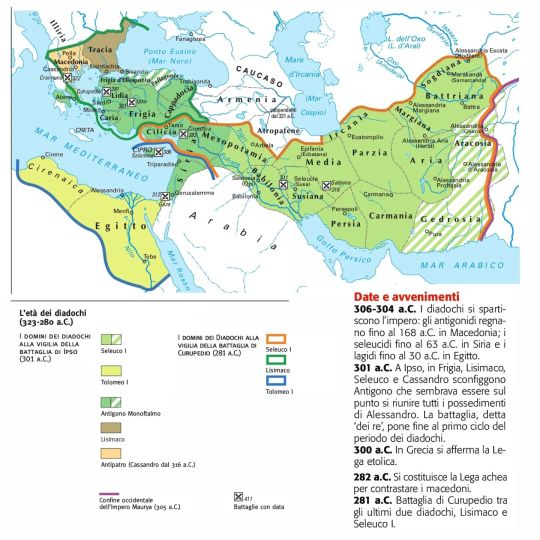
The Hellenistic world
"Atlante storico tascabile", Istituto Geografico De Agostini, Novara,1999
via cartesdhistoire
In 323 BC, Alexander died without heirs, possibly from the plague. His empire, already facing insurrectionary movements, did not outlive him. His generals, the Diadochi, began a protracted struggle for power: Antipater in Macedonia, Lysimachus in Thrace, Ptolemy in Egypt, Antigonus Monophthalmos in Asia Minor and Syria, and Seleucus in Babylon.
The first phase of the war among the Diadochi concluded at Ipsus in Phrygia in 301 BC, with the "battle of the kings." Lysimachus, Seleucus, and Cassander, son of Antipater, defeated Antigonus, who had been consistently victorious until then. Seleucus and Ptolemy, prudent rulers, founded dynasties destined for long endurance, even though they were not immune to the temptation of rebuilding Alexander's empire. The focal point of the conflict became Macedonia, and long wars ensued for its dominion.
The Epigones, successors of the Diadochi, instead supported the status quo. The kings of Egypt and Syria founded new cities, respecting the rights of existing poleis.
Nearly all Hellenistic kings surrounded themselves with scholars, artists, and scientists. Ptolemy I founded the largest library of antiquity in Alexandria, Egypt.
In 277 BC, the Galatians, of Celtic descent, settled in Asia Minor. Some provinces declared independence, including the kingdom of Pergamon, a city renowned for being built on terraces, distinguished by the splendor of its culture and art, exemplified by a library of 400,000 volumes.
The kingdom of Bactria, situated in the northern region of present-day Afghanistan, was also significant, representing the eastern extent of Hellenistic influence and serving as a crossroads between the cultures of the Mediterranean region and those of China and India.
Antiochus III, the greatest of the Seleucids, expanded the empire's territories. However, the invasion of Greece in 192 BC triggered a war with Rome. Following the war, the king was compelled to accept peace, marking the beginning of the inexorable decline of his empire.
84 notes
·
View notes
Text
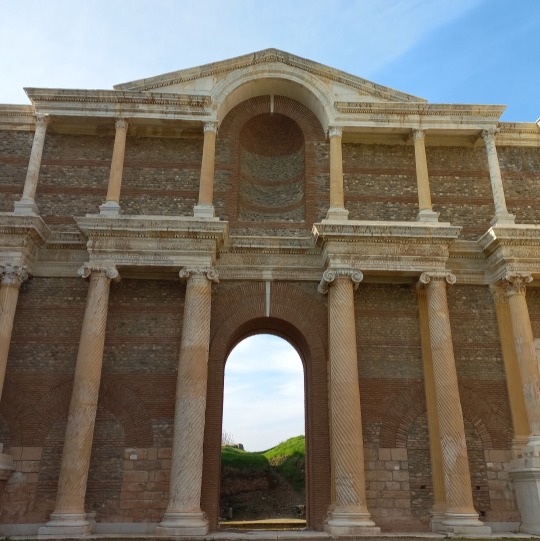
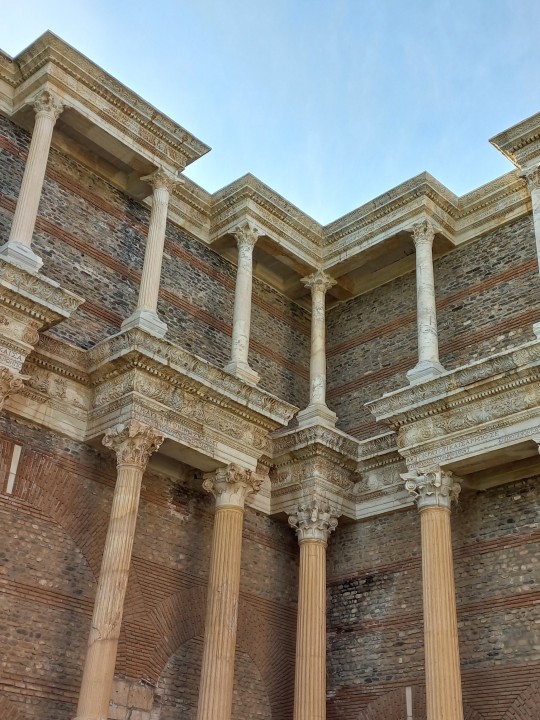

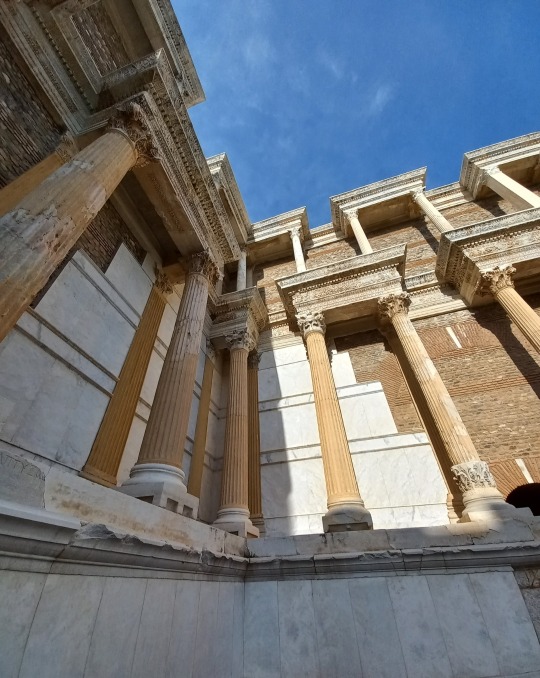
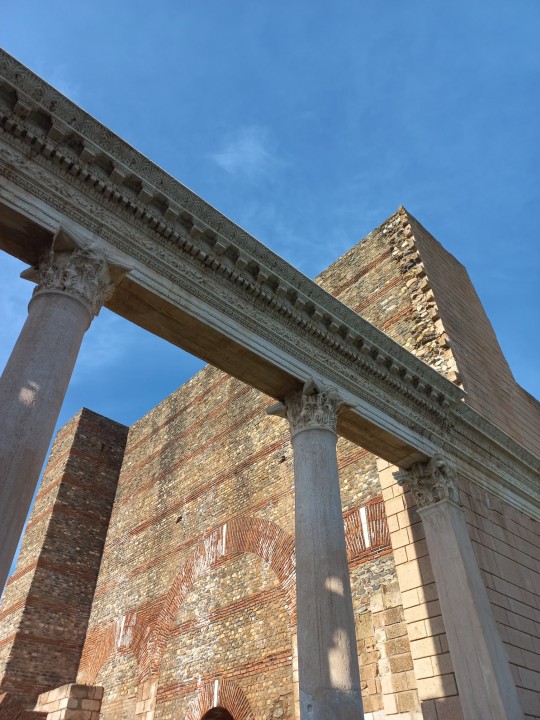
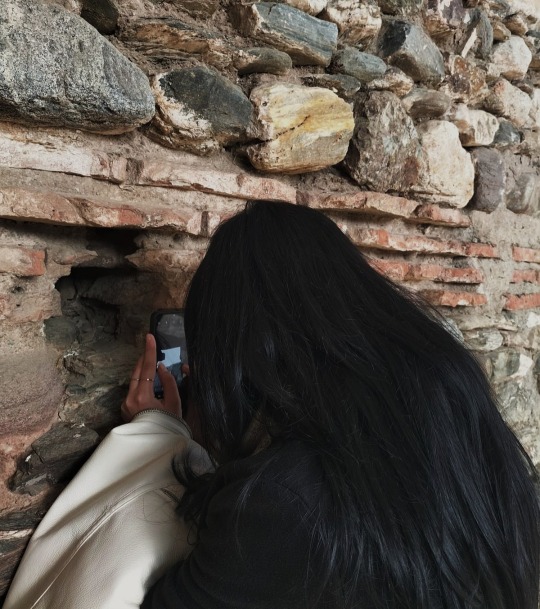
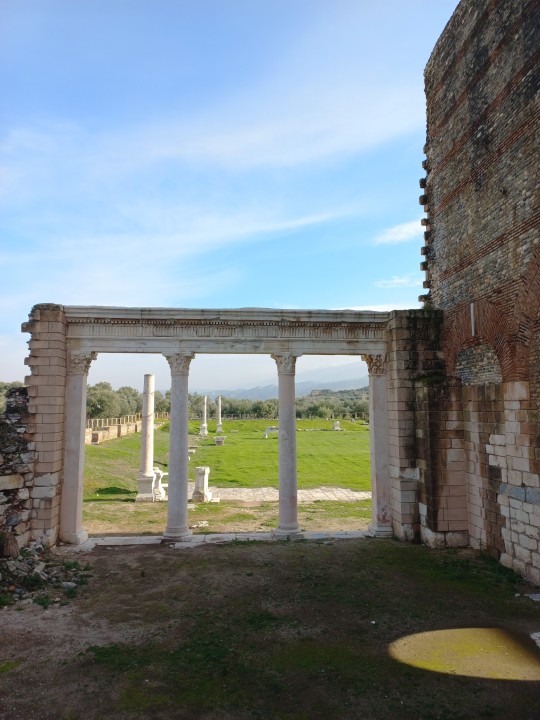
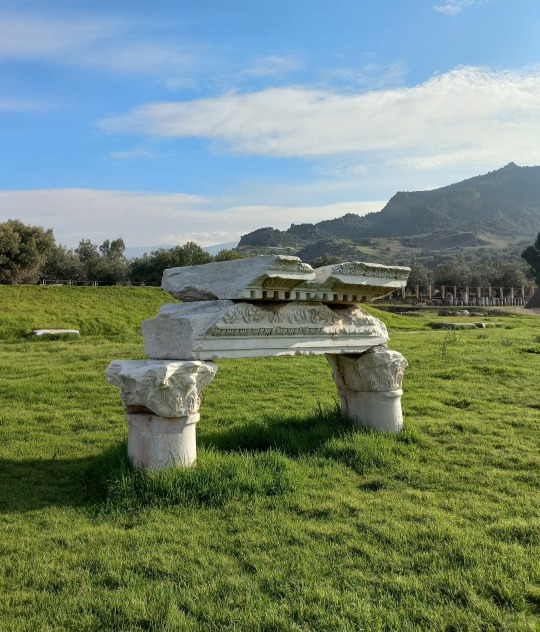
Sat, Jan 12 - I visited the ancient Roman city of Sardes today for the first time. (Information about the city is under this post.) It consisted of the Gymnasium with the remains of many Byzantine shops including restaurants and painting shops, a public pool, tombs, and a Synagogue. It was truly refreshing to see the place overall, but what I adored about the visit was the fact that you could imagine and experience the feeling of what it was like to be living in an ancient city, as it was empty because of the weather conditions. No voices, no noise, no motion, just the smell and the air of this ancient place. (I bet Henry Winter would die for it.) The Temple of Artemis was also close and I went there as well. I'll publish the pictures from the Synagogue and the Temple next if you want to check them out.
Sardis (/ˈsɑːrdɪs/ SAR-diss) or Sardes (/ˈsɑːrdiːs/SAR-de ess; Lydian: 𐤳𐤱𐤠𐤭𐤣, romanized: Sfard; Ancient Greek: Σάρδεις, romanized: Sárdeis; Old Persian: Sparda) was an ancient city best known as the capital of the Lydian Empire. After the fall of the Lydian Empire, it became the capital of the Persian satrapy of Lydia and later a major center of Hellenistic and Byzantine culture. It is now an active archaeological site in modern-day Turkey, in Manisa Province near Sart.
In 334 BC, Sardis was conquered by Alexander the Great. The city was surrendered without a fight, the local satrap having been killed during the Persian defeat at Granikos. After taking power, Alexander restored earlier Lydian customs and laws. For the next two centuries, the city passed between Hellenistic rulers including Antigonus Monophthalmos, Lysimachus, the Seleucids, and the Attalids. It was besieged by Seleucus I in 281 BC and by Antiochus III in 215-213 BC, but neither succeeded at breaching the acropolis, regarded as the strongest fortified place in the world. The city sometimes served as a royal residence, but was itself governed by an assembly.
In this era, the city took on a strong Greek character. The Greek language replaced the Lydian language in most inscriptions, and major buildings were constructed in Greek architectural styles to meet the needs of Greek cultural institutions. These new buildings included a prytaneion, gymnasium, theater, hippodrome, and the massive Temple of Artemis still visible to modern visitors. Jews were settled at Sardis by the Hellenistic king Antiochos III, where they built the Sardis Synagogue and formed a community that continued for much of Late Antiquity.
In 129 BC, Sardis passed to the Romans, under whom it continued its prosperity and political importance as part of the province of Asia. The city received three neocorate honors and was granted ten million sesterces as well as a temporary tax exemption to help it recover after a devastating earthquake in 17 AD.
Sardis had an early Christian community and is referred to in the New Testament as one of the seven churches of Asia. In the Book of Revelation, Jesus refers to Sardians as not finishing what they started, being about image rather than substance.
I take the pictures that are on my blog myself. In case you're interested in this post, I also post/reblog content including travel/cultural pictures, books, book recommendations, analysis, quotes, anything related to movies, series, and girl blog entries.
#sardes#ancient rome#ancient greek#gymnasium#ancient history#ancientmonuments#roman architecture#archeology#blog#travel#history#the secret history#henry winter#synagogue#dark academia#aesthetic#light academia#books#girlblogging#hellenistic#reading#if we were villains
35 notes
·
View notes
Text




The 8-day Jewish celebration known as #Hanukkah or #Chanukah begins today
The story:
2000 years ago the land of Israel was part of the Syrian-Greek Empire. Antiochus III, the King of Syria and his son Seleucus oppressed the Jews in the land of Israel.
That time, the Jewish Hellenists (Jews who accepted idol-worship and the Syrian-Greek way of life), while a tiny minority, have been amplified by the Greeks as they tokenized themselves against the Jewish people’s right to live as free people and as their own Jewish identity in the land of our ancestors (anti-Zionist Jews).
One day the henchmen of Antiochus arrived in the village of Modiin where Mattityahu, the old priest, lived. He built an altar and demanded that Mattityahu offer sacrifices to the Greek gods. Mattityahu refused.
One Hellenistic Jew approached the altar to offer a sacrifice, but Mattityahu stopped him and destroyed the altar.
Mattityahu knew that Antiochus would be enraged so he fled together with his sons and friends to the hills of Judea.
Many courageous Jews joined them and formed a rebellion. Before his death, Mattityahu called his sons together and urged them to continue to fight. In waging warfare, he said, their leader should be Judah the Strong. Judah was called "Maccabee," a word composed of the initial letters of the four Hebrew words מי כמכה באלים ה׳, "Who is like You, O God.”
Later, Antiochus sent his General Apolonius to wipe out Judah and his followers, the Maccabees. An army consisting of more than 40,000 men swept the land.
When Judah the Maccabee heard it, he said: "Let us fight unto death in defense of our souls and our Temple!"
The war was won and the Maccabees returned to Jerusalem, entered the Temple and cleared it of the idols placed by the Syrian vandals.
Since the golden Menorah had been stolen by the Syrians, the Maccabees now made one of cheaper metal.
There was only a small cruse of pure olive oil, which was sufficient to light only for one day. Yet, it continued to burn for 8 days. In the memory of the miracle, our sages appointed these eight days for annual thanksgiving and for lighting candles
Hen Mazzig
200 notes
·
View notes
Text
One of my increasingly favorite pastimes is imagining Shakespeare as an actor performing roles in his own plays, so without further ado, here are the roles we think Shakespeare he performed (per stylistic analysis and contemporary accounts):
The Lord (Induction) (Taming of the Shrew)
Antonio, the Duke (Two Gentlemen of Verona)
Suffolk (Henry VI Part 2)
Warwick, Old Clifford (Henry VI Part 3)
Mortimer or Exeter (Henry VI Part 1)
Aaron (Titus Andronicus)
Clarence, Scrivener, and Third Citizen (Richard III)
Egeon (Comedy of Errors)
Friar Lawrence and Chorus (Romeo and Juliet)
Duke Theseus (A Midsummer Night’s Dream)
Old Gaunt and/or the Gardener, the Lord (Richard II)
Leonato, the Friar (Much Ado About Nothing)
King Henry, Rumor (Henry IV Parts I & II)
The Garter Inn’s Host, Master Ford (The Merry Wives of Windsor)
Old Kno’well (Every Man In His Humor by Ben Jonson)
Chorus, Ely, and Mountjoy (Henry V)
Adam, later Corin (As You Like It)
Flavius (Julius Caesar)
Ghost, First Player (Hamlet)
Antonio (Twelfth Night)
Ulysses (Troilus and Cressida)
Macro and Sabinus (Sejanus His Fall by Ben Jonson)
Brabantio (Othello)
The King (All’s Well that Ends Well)
The Poet (Timon of Athens)
Duncan, perhaps Banquo later on (Macbeth)
Antiochus and Simonides, Cleon (Pericles)
#william shakespeare#shakespeare#i’m haunted by his aaron the moor#even his leonato…#he was said to perform old man/father/kingly roles#i also think he played lodovico in othello#also added the ben jonson ones because why not#oh and clarence!!!
19 notes
·
View notes
Photo

Polybius' Capture of Achaeus and Fall of Sardis
Polybius' Capture of Achaeus and Fall of Sardis is the account of the end of the Siege of Sardis (215-213 BCE) by Antiochus III (aka Antiochus the Great, r. 223-187 BCE) of the Seleucid Empire after the betrayal and capture of his cousin Achaeus (d. 213 BCE) who had proclaimed himself king.
Ruins of Sardis
Monsieurdl (CC BY-NC-SA)
Continue reading...
33 notes
·
View notes
Text
Holidays 12.13
Holidays
Acadian Remembrance Day (Canada)
Anesthesia Technicians Day (Turkey)
Bicycle Built For Two Day
Blame Someone Else Day
Clip-On Tie Day
Count the "La's" in "Deck the Halls" Day
Ella Josephine Baker Day
International ACAB Day
Jane Addams Day
Jum ir-Repubblika (Malta)
Loki Day
Martial Law Victims Remembrance Day (Poland)
Nanking Massacre Memorial Day (China)
National Bring Your Brother-in-Law to Work Day
National Day (Saint Lucia)
National Day of the Horse [also 2nd Saturday]
National Guard Day (US)
National Violin Day
New Calendar Day
Nusantara Day (Indonesia)
Peace Day (Korea)
Pick a Pathologist Pal Day
Reed Plant Dat (French Republic)
Republic Day (Malta)
Sailor’s Day (Brazil)
Santa Lucia Day (Sweden, Scandinavia)
Skip Day
Swiftie Day
Unreturned Library Book Day
World Violins Day
Yuletide Lad #2 arrives (Giljagaur or Gully Oaf; Iceland)
Food & Drink Celebrations
Ice Cream and Violins Day
National Cocoa Day
National Cream Cheese Frosting Day
National Ice Cream Day
National Popcorn String Day
World Raclette Day
2nd Wednesday in December
Book Club Day [2nd Wednesday]
Independence Days
Vendsyssel (Declared; 2018) [unrecognized]
Feast Days
Antiochus of Sulcis (Christian; Saint)
Aubert (Christian; Saint)
Comp-U-Coffee 2000 (Muppetism)
Emily Carr (Artology)
Euler (Positivist; Saint)
Feast of the Light-Bringer (Old Swedish Goddess of Light)
Hanukkah Day #6 (Judaism) [thru Dec. 15th]
Herman of Alaska (American Orthodox Church)
Ides of December (Ancient Rome)
John Marinoni (Christian; Blessed)
John Wayne Day (Church of the SubGenius; Saint)
Judoc (a.k.a. Joyce; Christian; Saint)
Kenelm, King (Christian; Saint)
Larry Storch Day (Church of the SubGenius; Saint)
Losar (Ladakh, India)
Losoong (a.k.a. Namsoong; Sikkim, India)
Luciadagen (a.k.a. Little Yule; Scandinavia)
Lucia’s Day (Pagan)
Lucy (Christian; Saint) [Writers]
Monkey Appreciation Day (Pastafarian)
Odile of Alsace (Christian; Saint)
Othilia (Christian; Saint)
The Sementivaem (Ancient Rome)
Tellus (Ancient Rome, with table spread for Ceres)
Thorn Cutting Ceremony Day (Glastonbury, England; Celtic)
Lucky & Unlucky Days
Martes (Unlucky Tuesday; Spanish culture) [Tuesday the 13th] (2 of 2 for 2022)
Prime Number Day: 347 [69 of 72]
Taian (大安 Japan) [Lucky all day.]
Triti (Unlucky Day; Greece) [Tuesday the 13th] (2 of 2 for 2022)
Premieres
Agents of S.H.I.E.L.D.: Slingshot (Web Series; 2016)
American Hustle (Film; 2013)
An American in Paris, by George Gershwin (Broadway Musical; 1928)
Bedknobs and Broomsticks (Disney Film; 1971)
Beyoncé, by Beyoncé (Album; 2013)
Bugsy (Film; 1991)
A Chorus Line (Film; 1985)
Clue (Film; 1985)
Dark Star, performed by the Grateful Dead (Song; 1967)
Driving Miss Daisy (Film; 1989)
Emily of New Moon, by L.M. Montgomery (Novel; 1923)
Fool Coverage (WB LT Cartoon; 1952)
Foxy Lady, recorded by Jimi Hendrix (Song; 1966)
The Getaway (Film; 1972)
The Hobbit: The Desolation of Smaug (Film; 2013) [3 of 3]
Jerry Maguire (Film; 1996)
The Jewel of the Nile (Film; 1985)
Jumanji: The Next Level (Film; 2019)
The Lord of the Rings: The War of the Rohirrim (Animated Film; 2024)
Maid in Manhattan (Film; 2002)
Mars Attacks! (Film; 1996)
A Miser Brothers’ Christmas (Animated TV Special; 2008)
Monitored Noose or The Carbon Copy-Cats (Rocky & Bullwinkle Cartoon, S1, Ep. 6; 1959)
My Name is Nobody (Film; 1973)
The Poseidon Adventure (Film; 1972)
Rakuen Tsuiho: Expelled from Paradise (Anime Film; 2014)
Richard III (Film; 1955)
Saving Mr. Banks (Film; 2013)
Scooby-Doo! Pirates ahoy! (WB Animated Film; 2005)
The Scorched Moose (Rocky & Bullwinkle Cartoon, S1, Ep. 5; 1959)
Sense and Sensibility (Film; 1996)
6 Underground (Film; 2019)
Star Trek: Nemesis (Film; 2002)
Tristessa, by Jack Kerouac (Novel; 1960)
Uncut Gems (Film; 2019)
Wind (Pixar Cartoon; 2019)
Today’s Name Days
Jodok, Lucia, Odilia (Austria)
Jasna, Lucija, Otilija, Svjetlana (Croatia)
Lucie (Czech Republic)
Lucia (Denmark)
Ele, Ere, Hele, Loviise, Lucia, Luise, Viise (Estonia)
Seija (Finland)
Jocelyn, Lucie (France)
Jodok, Johanna, Lucia, Ottilia (Germany)
Aris, Efstratios, Ioubenalios, Evstratios, Loukia, Lucy, Stratos (Greece)
Luca, Otilia (Hungary)
Antioco, Lucia (Italy)
Lūcija, Veldze (Latvia)
Eiviltė, Kastautas, Kastytis, Liucija, Otilija (Lithuania)
Lucia, Lydia (Norway)
Łucja, Lucja, Otylia, Włodzisława (Poland)
Dosoftei (Romania)
Lucia (Slovakia)
Lucía, Otilia (Spain)
Lucia (Sweden)
Louise, Lucia, Lukia (Ukraine)
Cinderella, Cindy, Cynth, Cynthia (USA)
Today is Also…
Day of Year: Day 347 of 2024; 18 days remaining in the year
ISO: Day 3 of week 50 of 2023
Celtic Tree Calendar: Ruis (Elder) [Day 16 of 28]
Chinese: Month 12 (Jia-Zi), Day 1 (Yi-Si)
Chinese Year of the: Rabbit 4721 (until February 10, 2024)
Hebrew: 1 Teveth 5784
Islamic: 30 Jumada I 1445
J Cal: 17 Zima; Threesday [17 of 30]
Julian: 30 November 2023
Moon: 1%: Waxing Crescent
Positivist: 11 Bichat (13th Month) [Euler]
Runic Half Month: Jara (Year) [Day 3 of 15]
Season: Autumn (Day 81 of 89)
Zodiac: Sagittarius (Day 22 of 30)
Calendar Changes
冰月 [Bīngyuè] (Chinese Lunisolar Calendar) [Month 12 of 12] (Ice Month) [Earthly Branch: Ox Month] (End-of-Year Month)
Ṭēḇēṯ (a.k.a. Tevet, Tebeth & Tebetu) [טֵבֵת] (Hebrew Calendar) [Month 10 of 12]
2 notes
·
View notes
Photo





÷
·
𒀭𒀀𒉣𒈾 ANUNNAKI ·
·
šakkanakki Bābili · King of Babylon ·
·
· ·
Sumu-abum
Sumu-la-El Sabium
Apil-Sin
Sin-Muballit Hammurabi
Samsu-iluna
Abi-Eshuh Ammi-Ditana
Ammi-Saduqa Samsu-Ditana
Dynasty I · Amorite · 1894–1595 BC
. .
.
Ilum-ma-ili Itti-ili-nibi
Damqi-ilishu
Ishkibal Shushushi
Gulkishar
DIŠ-U-EN Peshgaldaramesh
Ayadaragalama
Akurduana Melamkurkurra
Ea-gamil
Dynasty II · 1st Sealand · 1725–1475 BC
·
· ·
· ·
Gandash
Agum I Kashtiliash I
Abi-Rattash Kashtiliash II
Urzigurumash
Agum II Harba-Shipak
Shipta'ulzi
Burnaburiash I Ulamburiash
Kashtiliash III
Agum III
Kadashman-Sah
Karaindash Kadashman-Harbe I
Kurigalzu I
Kadashman-Enlil I Burnaburiash II
Kara-hardash
Nazi-Bugash Kurigalzu II
Nazi-Maruttash
Kadashman-Turgu Kadashman-Enlil II
Kudur-Enlil
Shagarakti-Shuriash Kashtiliash IV
Enlil-nadin-shumi
Kadashman-Harbe II Adad-shuma-iddina
Adad-shuma-usur
Meli-Shipak
Marduk-apla-iddina I
Zababa-shuma-iddin
Enlil-nadin-ahi
Dynasty III · Kassite · 1729–1155 BC
. .
.
·
· ·
Marduk-kabit-ahheshu
Itti-Marduk-balatu Ninurta-nadin-shumi
Nebuchadnezzar I
Enlil-nadin-apli Marduk-nadin-ahhe
Marduk-shapik-zeri Adad-apla-iddina
Marduk-ahhe-eriba Marduk-zer-X
Nabu-shum-libur
Dynasty IV · 2nd Isin · 1153–1022 BC
· ·
· ·
·
Simbar-shipak
Ea-mukin-zeri Kashshu-nadin-ahi
.
Dynasty V · 2nd Sealand · 1021–1001 BC
· ·
· ·
Eulmash-shakin-shumi Ninurta-kudurri-usur I
Shirikti-shuqamuna
Dynasty VI · Bazi · 1000–981 BC
·
· ·
·
Mar-biti-apla-usur
Dynasty VII · Elamite · 980–975 BC
·
· ·
·
· ·
Nabu-mukin-apli Ninurta-kudurri-usur II
Mar-biti-ahhe-iddina Shamash-mudammiq
Nabu-shuma-ukin I Nabu-apla-iddina
Marduk-zakir-shumi I Marduk-balassu-iqbi
Baba-aha-iddina
.
.
.
at least 4 years
Babylonian interregnum
Ninurta-apla-X Marduk-bel-zeri
Marduk-apla-usur Eriba-Marduk
Nabu-shuma-ishkun Nabonassar
Nabu-nadin-zeri Nabu-shuma-ukin II
Dynasty VIII · E · 974–732 BC
· ·
·
·
·
Nabu-mukin-zeri Tiglath-Pileser III
Shalmaneser V Marduk-apla-iddina II
Sargon II Sennacherib
Marduk-zakir-shumi II Marduk-apla-iddina II
Bel-ibni Aššur-nādin-šumi
Nergal-ushezib Mushezib-Marduk
Sennacherib aka Sîn-ahhe-erība
Esarhaddon aka Aššur-aḫa-iddina
Ashurbanipal
Šamaš-šuma-ukin
Aššur-bāni-apli Sîn-šumu-līšir
Sîn-šar-iškun
Dynasty IX · Assyrian · 732–626 BC
. .
.
.
Nabopolassar
Nabû-apla-uṣur
Nebuchadnezzar II
Nabû-kudurri-uṣur
Amēl-Marduk
Neriglissar
Nergal-šar-uṣur
Lâbâši-Marduk
Nabonidus
Nabû-naʾid
Dynasty X · Chaldean · 626–539 BC
. ·
. ·
. ·
. ·
. ·
. ·
Cyrus II the Great · Kuraš · 𐎤𐎢𐎽𐎢𐏁 Kūruš ·
Cambyses II · Kambuzīa ·
Bardiya · Barzia ·
Nebuchadnezzar III · Nabû-kudurri-uṣur ·
·
Darius I the Great · Dariamuš · 1st reign
·
Nebuchadnezzar IV · Nabû-kudurri-uṣur
Darius I the Great · Dariamuš · 2nd reign
·
Xerxes I the Great · Aḫšiaršu · 1st reign
·
Shamash-eriba · Šamaš-eriba
Bel-shimanni · Bêl-šimânni
·
Xerxes I the Great · Aḫšiaršu · 2nd reign
·
Artaxerxes I · Artakšatsu
Xerxes II
Sogdianus
Darius II
Artaxerxes II
Artaxerxes III
Artaxerxes IV
Nidin-Bel
Darius III
Babylon under foreign rule · 539 BC – AD 224
Dynasty XI · Achaemenid · 539–331 BC
·. ·
·. ·
·. ·
·. ·
·. ·
·.
Alexander III the Great · Aliksandar
Philip III Arrhidaeus · Pilipsu
Antigonus I Monophthalmus · Antigunusu
Alexander IV · Aliksandar
Dynasty XII · Argead · 331–305 BC
·.
·.
·.
·.
·.
Seleucus I Nicator · Siluku
Antiochus I Soter · Antiʾukusu
Seleucus · Siluku
Antiochus II Theos · Antiʾukusu
Seleucus II Callinicus · Siluku
Seleucus III Ceraunus ·
Antiochus III the Great · Antiʾukusu
Antiochus ·
Seleucus IV Philopator · Siluku
Antiochus IV Epiphanes ·
Antiochus
Antiochus V Eupator
Demetrius I Soter
Timarchus
Demetrius I Soter
Alexander Balas
Demetrius II Nicator
Dynasty XIII · Seleucid · 305–141 BC
· ·.
. · ·
. · ·
. · ·
· ·.
· ·.
Mithridates I
Phraates II
Rinnu
Antiochus VII Sidetes
Phraates II
Ubulna
Hyspaosines
Artabanus I
Mithridates II
Gotarzes I
Asi'abatar
Orodes I
Ispubarza
Sinatruces
Phraates III
Piriustana
Teleuniqe
Orodes II
Phraates IV
Phraates V
Orodes III
Vonones I
Artabanus II
Vardanes I
Gotarzes II
Vonones II
Vologases I
Pacorus II
Artabanus III
Osroes I
Vologases III
Parthamaspates
Vologases IV
Vologases V
Vologases VI
Artabanus IV
Dynasty XIV · Arsacid · 141 BC – AD 224
· 9 centuries of Persian Empires · until AD 650
Trajan in AD 116
mid-7th-century Muslim Empire
·.
·.
·.
1921 Iraqi State
·.
·.
1978 · 14th of February · Saddam Hussein
·.
·.
2009 · May · the provincial government of Babil
·.
·.
·.
·.
. ·
·.
·.
·.
·.
so many kings
and just one queen
semiramis
·· ·
· SEMIRAMIS ·
··
.
.
.
.
···· Βαβυλών ··· ΒΑΒΥΛΩΝ ····
Babylonia
Gate of the Gods
بابل Babil 𒆍𒀭𒊏𒆠 · 𒆍𒀭𒊏𒆠 · 𐡁𐡁𐡋 · ܒܒܠ · בָּבֶל
Iraq · 55 miles south of Baghdad
near the lower Euphrates river
.
.
.
.
.
#king#of#babylon#semiramis#assur#uruk#mar-biti-apla-usur#marduk-apla-usur#mesopotamia#annunaki#anunnaki
2 notes
·
View notes
Text
I didn't expect Hannibal Barca and Antiochus (III) the Great would know each other and Hannibal would be a military advisor to Antiochus the Great when first learning about this.
@scribl1ta
1 note
·
View note
Text
I just need someone to make a movie about Antiochus III's tense dinner party with Scipio and an exiled Hannibal.
18 notes
·
View notes
Photo

Circa 180 BCE coin of Laodike IV, a daughter of Antiochus III the Great and Laodice III. She was the first of the Seleucid princesses involved in sibling marriages in the style of the Ptolomies. Her first marriage was to her eldest brother Antiochos who died before he could inherit the throne. She then married her second eldest brother Seleucus IV Philopator.
4 notes
·
View notes
Text
DANIEL 11:23 (175 B.C.E. - 164 B.C.E.)
“And after The League made with Him [Eumenes II of Pergamon (197 B.C.E. – 159 B.C.E.)],
He [Mithradates, later Antiochus IV (175 B.C.E. – 164 B.C..E.)] shall work deceitfully;
For He [Antiochus IV (175 B.C.E. – 164 B.C.E.)] shall come up [To The Seleucid Throne];
And shall become strong with a small people [force].”
Antiochus IV, Mithradates, The Third Son of Antiochus III, The…

View On WordPress
0 notes
Text
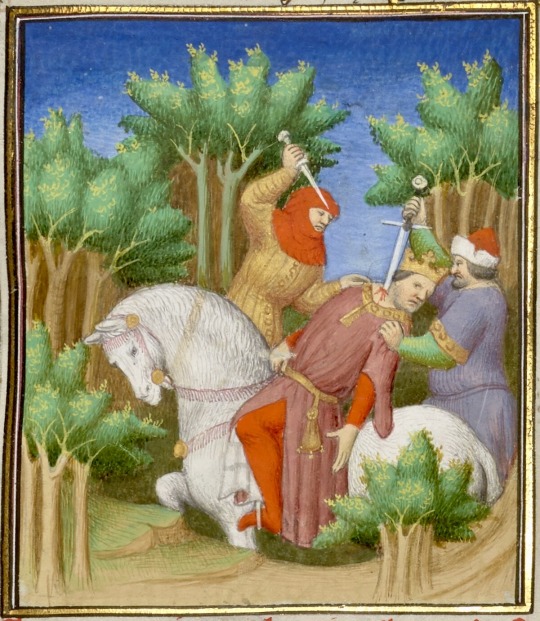
The Murder of Antiochus III, from Des cas des nobles hommes et femmes (Ms. 63 (96.MR.17)) French, ca. 1413-1415
1 note
·
View note
Text
Holidays 12.13
Holidays
Acadian Remembrance Day (Canada)
Anesthesia Technicians Day (Turkey)
Bicycle Built For Two Day
Blame Someone Else Day
Clip-On Tie Day
Count the "La's" in "Deck the Halls" Day
Ella Josephine Baker Day
International ACAB Day
Jane Addams Day
Jum ir-Repubblika (Malta)
Loki Day
Martial Law Victims Remembrance Day (Poland)
Nanking Massacre Memorial Day (China)
National Bring Your Brother-in-Law to Work Day
National Day (Saint Lucia)
National Day of the Horse [also 2nd Saturday]
National Guard Day (US)
National Violin Day
New Calendar Day
Nusantara Day (Indonesia)
Peace Day (Korea)
Pick a Pathologist Pal Day
Reed Plant Dat (French Republic)
Republic Day (Malta)
Sailor’s Day (Brazil)
Santa Lucia Day (Sweden, Scandinavia)
Skip Day
Swiftie Day
Unreturned Library Book Day
World Violins Day
Yuletide Lad #2 arrives (Giljagaur or Gully Oaf; Iceland)
Food & Drink Celebrations
Ice Cream and Violins Day
National Cocoa Day
National Cream Cheese Frosting Day
National Ice Cream Day
National Popcorn String Day
World Raclette Day
2nd Wednesday in December
Book Club Day [2nd Wednesday]
Independence Days
Vendsyssel (Declared; 2018) [unrecognized]
Feast Days
Antiochus of Sulcis (Christian; Saint)
Aubert (Christian; Saint)
Comp-U-Coffee 2000 (Muppetism)
Emily Carr (Artology)
Euler (Positivist; Saint)
Feast of the Light-Bringer (Old Swedish Goddess of Light)
Hanukkah Day #6 (Judaism) [thru Dec. 15th]
Herman of Alaska (American Orthodox Church)
Ides of December (Ancient Rome)
John Marinoni (Christian; Blessed)
John Wayne Day (Church of the SubGenius; Saint)
Judoc (a.k.a. Joyce; Christian; Saint)
Kenelm, King (Christian; Saint)
Larry Storch Day (Church of the SubGenius; Saint)
Losar (Ladakh, India)
Losoong (a.k.a. Namsoong; Sikkim, India)
Luciadagen (a.k.a. Little Yule; Scandinavia)
Lucia’s Day (Pagan)
Lucy (Christian; Saint) [Writers]
Monkey Appreciation Day (Pastafarian)
Odile of Alsace (Christian; Saint)
Othilia (Christian; Saint)
The Sementivaem (Ancient Rome)
Tellus (Ancient Rome, with table spread for Ceres)
Thorn Cutting Ceremony Day (Glastonbury, England; Celtic)
Lucky & Unlucky Days
Martes (Unlucky Tuesday; Spanish culture) [Tuesday the 13th] (2 of 2 for 2022)
Prime Number Day: 347 [69 of 72]
Taian (大安 Japan) [Lucky all day.]
Triti (Unlucky Day; Greece) [Tuesday the 13th] (2 of 2 for 2022)
Premieres
Agents of S.H.I.E.L.D.: Slingshot (Web Series; 2016)
American Hustle (Film; 2013)
An American in Paris, by George Gershwin (Broadway Musical; 1928)
Bedknobs and Broomsticks (Disney Film; 1971)
Beyoncé, by Beyoncé (Album; 2013)
Bugsy (Film; 1991)
A Chorus Line (Film; 1985)
Clue (Film; 1985)
Dark Star, performed by the Grateful Dead (Song; 1967)
Driving Miss Daisy (Film; 1989)
Emily of New Moon, by L.M. Montgomery (Novel; 1923)
Fool Coverage (WB LT Cartoon; 1952)
Foxy Lady, recorded by Jimi Hendrix (Song; 1966)
The Getaway (Film; 1972)
The Hobbit: The Desolation of Smaug (Film; 2013) [3 of 3]
Jerry Maguire (Film; 1996)
The Jewel of the Nile (Film; 1985)
Jumanji: The Next Level (Film; 2019)
The Lord of the Rings: The War of the Rohirrim (Animated Film; 2024)
Maid in Manhattan (Film; 2002)
Mars Attacks! (Film; 1996)
A Miser Brothers’ Christmas (Animated TV Special; 2008)
Monitored Noose or The Carbon Copy-Cats (Rocky & Bullwinkle Cartoon, S1, Ep. 6; 1959)
My Name is Nobody (Film; 1973)
The Poseidon Adventure (Film; 1972)
Rakuen Tsuiho: Expelled from Paradise (Anime Film; 2014)
Richard III (Film; 1955)
Saving Mr. Banks (Film; 2013)
Scooby-Doo! Pirates ahoy! (WB Animated Film; 2005)
The Scorched Moose (Rocky & Bullwinkle Cartoon, S1, Ep. 5; 1959)
Sense and Sensibility (Film; 1996)
6 Underground (Film; 2019)
Star Trek: Nemesis (Film; 2002)
Tristessa, by Jack Kerouac (Novel; 1960)
Uncut Gems (Film; 2019)
Wind (Pixar Cartoon; 2019)
Today’s Name Days
Jodok, Lucia, Odilia (Austria)
Jasna, Lucija, Otilija, Svjetlana (Croatia)
Lucie (Czech Republic)
Lucia (Denmark)
Ele, Ere, Hele, Loviise, Lucia, Luise, Viise (Estonia)
Seija (Finland)
Jocelyn, Lucie (France)
Jodok, Johanna, Lucia, Ottilia (Germany)
Aris, Efstratios, Ioubenalios, Evstratios, Loukia, Lucy, Stratos (Greece)
Luca, Otilia (Hungary)
Antioco, Lucia (Italy)
Lūcija, Veldze (Latvia)
Eiviltė, Kastautas, Kastytis, Liucija, Otilija (Lithuania)
Lucia, Lydia (Norway)
Łucja, Lucja, Otylia, Włodzisława (Poland)
Dosoftei (Romania)
Lucia (Slovakia)
Lucía, Otilia (Spain)
Lucia (Sweden)
Louise, Lucia, Lukia (Ukraine)
Cinderella, Cindy, Cynth, Cynthia (USA)
Today is Also…
Day of Year: Day 347 of 2024; 18 days remaining in the year
ISO: Day 3 of week 50 of 2023
Celtic Tree Calendar: Ruis (Elder) [Day 16 of 28]
Chinese: Month 12 (Jia-Zi), Day 1 (Yi-Si)
Chinese Year of the: Rabbit 4721 (until February 10, 2024)
Hebrew: 1 Teveth 5784
Islamic: 30 Jumada I 1445
J Cal: 17 Zima; Threesday [17 of 30]
Julian: 30 November 2023
Moon: 1%: Waxing Crescent
Positivist: 11 Bichat (13th Month) [Euler]
Runic Half Month: Jara (Year) [Day 3 of 15]
Season: Autumn (Day 81 of 89)
Zodiac: Sagittarius (Day 22 of 30)
Calendar Changes
冰月 [Bīngyuè] (Chinese Lunisolar Calendar) [Month 12 of 12] (Ice Month) [Earthly Branch: Ox Month] (End-of-Year Month)
Ṭēḇēṯ (a.k.a. Tevet, Tebeth & Tebetu) [טֵבֵת] (Hebrew Calendar) [Month 10 of 12]
0 notes
Text
Factors Leading to the Maccabean Revolt (Part 1)
Factors Leading to the Maccabean Revolt (Part 1) - http://wp.me/pjGbY-3lX
There were several factors which led to the Maccabean Revolt. Early in his reign, Antiochus IV Epiphanes was involved in a dispute over the high priesthood in Jerusalem. Onias III was the legitimate High Priest. His pro-Hellenism brother Jason traveled to the newly established Antiochus and bribed the king to be appointed as High Priest (1 Mac 1:13-15, 2 Mac 4:7-15). In order to please Antiochus,…

View On WordPress
1 note
·
View note